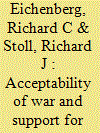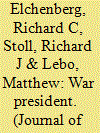|
|
|
Sort Order |
|
|
|
Items / Page
|
|
|
|
|
|
|
| Srl | Item |
| 1 |
ID:
152414


|
|
|
|
|
| Summary/Abstract |
We study the factors that influence citizen support for defense spending in fourteen democracies over the period 2004–2013. We pose two research questions. First, what factors influence citizen support for war and military force? We refer to this as the acceptability of war. Second, in addition to the acceptability of war, what other factors affect support for defense spending? Our principal finding is that citizen acceptance of war and support for defense spending are most influenced by basic beliefs and values. Gender also has a strong negative influence on attitudes toward war and thus indirectly lowers support for defense spending among women. Attitudes toward war and defense spending are also sometimes influenced by short-term threats and by alliance considerations, but the effects are not as substantively meaningful. We conclude with a summary of the results and a discussion of the implications for theory and policy.
|
|
|
|
|
|
|
|
|
|
|
|
|
|
|
|
| 2 |
ID:
113826


|
|
|
|
|
| Publication |
2012.
|
| Summary/Abstract |
Gender is now recognized as an important dividing line in American political life, and scholars have accumulated evidence that national security issues are an important reason for gender differences in policy preferences. We therefore expect that the dynamics of support for defense spending among men and women will differ. In contrast, several scholars have shown that population subgroups exhibit a "parallel" dynamic in which the evolution of their preferences over time is very similar, despite differences in the average level of support. Unfortunately, there is little time series evidence on gendered reactions to policy, including defense spending, that would allow one to arbitrate between these competing perspectives. In this research note, we assemble a time series of support for defense spending among men and women and model the determinants of that support for the period 1967-2007. We find that women are on average less supportive of defense spending than are men. However, we also find that the over time variation of support for defense spending among men and women is very similar-each is conditioned principally by the past year's change in defense spending and occasionally by war casualties and a trade-off between defense and civilian spending.
|
|
|
|
|
|
|
|
|
|
|
|
|
|
|
|
| 3 |
ID:
190759


|
|
|
|
|
| Summary/Abstract |
Since 1995, presidents from both parties have increased US government initiatives in pursuit of global gender equality, but there has been little scholarly work that explores public support for these initiatives. We analyze the level of citizen support for several types of global gender equality programs. In addition, we explore support for one specific rationale for the policy –the argument that the participation of women in decision-making will make the world a more peaceful place. Our central hypothesis is that personal security dispositions are an important correlate of support for global gender initiatives, and our analysis yields support for the hypothesis. Citizens who place a high value on personal security display stronger support for gender equality in foreign policy. We close with suggestions for further research and discuss the policy implications of our findings, in particular with respect to public opinion on the use of military force.
|
|
|
|
|
|
|
|
|
|
|
|
|
|
|
|
| 4 |
ID:
034318


|
|
|
|
|
| Publication |
Boulder, Lynne Rienners Puublishers, 1989.
|
| Description |
ix, 242p.
|
| Standard Number |
1555871259
|
|
|
|
|
|
|
|
|
|
|
|
Copies: C:1/I:0,R:0,Q:0
Circulation
| Accession# | Call# | Current Location | Status | Policy | Location |
| 032252 | 327.1/STO 032252 | Main | On Shelf | General | |
|
|
|
|
| 5 |
ID:
061306


|
|
|
|
|
| Publication |
Columbia, University of South Carolina Press, 1990.
|
| Description |
xvi, 263p.
|
| Series |
Studies in international relations
|
| Standard Number |
0872496783
|
|
|
|
|
|
|
|
|
|
|
|
Copies: C:1/I:0,R:0,Q:0
Circulation
| Accession# | Call# | Current Location | Status | Policy | Location |
| 032750 | 355.033573/STO 032750 | Main | On Shelf | General | |
|
|
|
|
| 6 |
ID:
076110


|
|
|
|
|
|
|
|